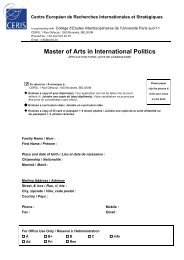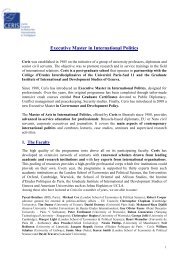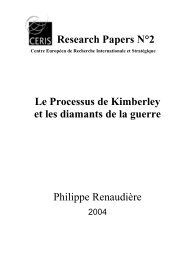hydropolitics of the tigris - euphrates river basin with - ceris.be
hydropolitics of the tigris - euphrates river basin with - ceris.be
hydropolitics of the tigris - euphrates river basin with - ceris.be
Create successful ePaper yourself
Turn your PDF publications into a flip-book with our unique Google optimized e-Paper software.
The Role <strong>of</strong> <strong>the</strong> EU: Regional Power and External Mediator?<br />
EU Development Policy on Water<br />
One <strong>of</strong> <strong>the</strong> biggest powers in <strong>the</strong> region in terms <strong>of</strong> size, political and potential economic influence<br />
(especially since <strong>the</strong> new accessions <strong>of</strong> 1 May, 2004) is <strong>the</strong> European Union (EU). While <strong>the</strong> EU may not<br />
have a specific policy dealing <strong>with</strong> <strong>the</strong> Tigris-Euphrates region, <strong>the</strong> EU’s development policy provides<br />
guidelines for development that can <strong>be</strong> applied to most <strong>river</strong> <strong>basin</strong>s. It situates <strong>the</strong> management <strong>of</strong> water<br />
resources <strong>with</strong>in <strong>the</strong> overall priority <strong>of</strong> <strong>the</strong> social sector and links water to many o<strong>the</strong>r sectors such as health,<br />
food security, transport and trade. Guidelines have <strong>be</strong>en produced based on <strong>the</strong> Dublin Principles (from <strong>the</strong><br />
International Conference on Water and <strong>the</strong> Environment, Dublin 1992) and Agenda 21 from <strong>the</strong> first Earth<br />
Summit held in Rio de Janeiro in 1992. These guidelines promote <strong>the</strong> <strong>river</strong> <strong>basin</strong> as <strong>the</strong> geographical setting<br />
for practicing Integrated Water Resources Management (IWRM). Also included are some economic and<br />
financial principles such as:<br />
� Water has an economic value and should <strong>be</strong> recognized as an economic good<br />
� Charging tariffs for water services is an important component <strong>of</strong> any strategy for sustainability. 88<br />
These guidelines, although comprehensive, tend to focus on development tools at <strong>the</strong> national level and<br />
don’t provide clear guidelines for <strong>the</strong> International scale. However in a recent EU policy note for water<br />
sectoral development, <strong>the</strong> document places at <strong>the</strong> top <strong>of</strong> its list ‘trans-boundary water management for<br />
conflict prevention’ as <strong>the</strong> first key global challenge for <strong>the</strong> future. 89<br />
The broader EU Water and Development Policy, while strongly linked to poverty reduction, pursues <strong>the</strong><br />
issues <strong>of</strong> trans-boundary co-operation and conflict prevention <strong>be</strong>tween states by emphasising sustainable<br />
<strong>river</strong> <strong>basin</strong> management. In <strong>the</strong> Communication on Conflict Prevention (11 April 2001), EC support is<br />
recommended where a clear commitment to regional collaboration exists “<strong>with</strong>in and, in <strong>the</strong> case <strong>of</strong> trans-<br />
boundary water resources, <strong>be</strong>tween states concerned, through sustainable <strong>river</strong> <strong>basin</strong> management…” 90<br />
30





